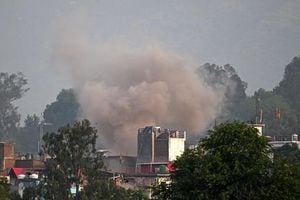The Progressive Conservatives will form a third consecutive majority government after winning Ontario's snap winter election on February 27, 2025, with Doug Ford remaining as Premier.
Trudeau's statement congratulated Ford and his party, emphasizing the need for collaboration to defend Canadian interests and bolster the economy, especially against U.S. tariff threats. At the provincial level, the Liberals, under Bonnie Crombie's leadership, secured enough seats to regain official party status, returning to the fold after two dismal terms.
Much of the focus was on Crombie's loss at the tight electoral battle for Mississauga East-Cooksville, which had not previously been held by the PCs. Crombie’s defeat came as she acknowledged the challenges of the election results—an outcome she called “not what we hoped for” but proudly noted the achievement of party status.
The election, the first of its kind held during the winter months since 1981, was triggered by Ford appealing for public support amid the rising threats from U.S. President Donald Trump’s administration. Critics argued it was more about personal political strategy than necessity.
Each party leader made substantial efforts during the last days of campaigning. Crombie ended her campaign with fervor, rallying supporters and hoping to make headway against the Conservative status quo. Meanwhile, NDP leader Marit Stiles, who has held her seat since 2018, managed to secure the opposition position, calling for increased unity regardless of their electoral challenges.
Voter turnout statistics reflected concerns, as early advance voting ran lower than previous elections, raising questions about engagement levels within Ontario’s communities. Yet, those engaged with political strategies correctly perceived Hamilton as pivotal for their campaigns, marking it as home to some of the closest riding races.
Ford's Conservative heavy-hitting campaign focused on economic stability as the backbone of his platform. His campaign’s outreach to voters was underpinned by two trips to Washington, DC, aimed at reassuring residents of Ontario about the government’s handling of potentially overwhelming tariff measures.
Political analyst insights highlighted past riding standings, emphasizing the significance of key figures such as Sarah Jama and Robin Lennox’s local candidacies. Jama, ousted from the NDP caucus over various disputes, failed to reclaim her seat as she campaigned for her position as an Independent. Lennox based her campaign on strong community ties and established healthcare credentials.
Dodging past allegations of political timing, Ford affirmed his need for electoral mandate before tackling challenges tied to external economic pressures. "We need this strong mandate to deal with the next four years," he asserted, reitering his position throughout the campaign.
Crombie, nonetheless, confirmed her intention to retain her leadership role during her speech after the vote count, declaring, "We are not done yet!" and emphasized the importance of persistence following their losses. Highlighting the Liberals’ regained stature, she urged supporters to turn their attention to the work needed for future successes.
NDP’s Stiles also held firm to her leadership and vowed to continue advocating for the working-class constituents, expressing confidence over maintaining the party's voice across Ontario. "We will keep fighting for you, no matter the odds," she stated.
Schreiner maintains momentum within his party post-election, carrying expectations higher as the Green Party secured its historical roots within Guelph. "Winning Guelph means we can continue to build on our progress. This win matters as we push for environmental reforms across Ontario, widening our focus", he stated.
With Fairclough’s stunning win for the Liberals, alongside multiple strategic wins for other candidates, the election solidifies certain party dynamics and will shape future strategies for upcoming electoral battles.
The results from this election are deemed conclusive, but their ripple effects on Ontario politics are just beginning. The Progressive Conservatives may have secured their footing, but the resilience from the opposition parties promises to keep the political discourse vibrant.
One thing remains evident—the outcome of the 2025 Ontario election signifies continued evolution within the province’s legislative spectrum.



